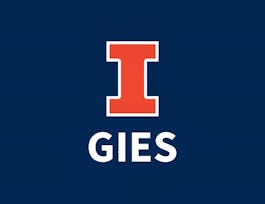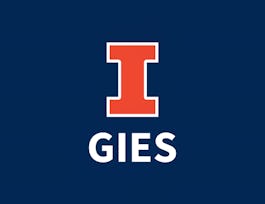This course examines the U.S. federal tax system as it relates to property transactions of business owners and shareholders. Topics include cost recovery, such as depreciation, amortization, and depletion; calculation of realized versus recognized gains and losses; evaluation of the potential tax effects of nontaxable exchanges; and the combining, or netting, gains and losses that are different in nature. Assignments facilitate self-discovery of knowledge and development of a variety of professional skills.


Federal Taxation II: Property Transactions of Business Owners and Shareholders
This course is part of U.S. Federal Taxation Specialization
Taught in English
Some content may not be translated

Instructor: Matthew Hutchens
8,684 already enrolled
Included with 
Course
(174 reviews)
94%
Details to know

Add to your LinkedIn profile
46 quizzes
Course
(174 reviews)
94%
See how employees at top companies are mastering in-demand skills

Build your subject-matter expertise
- Learn new concepts from industry experts
- Gain a foundational understanding of a subject or tool
- Develop job-relevant skills with hands-on projects
- Earn a shareable career certificate


Earn a career certificate
Add this credential to your LinkedIn profile, resume, or CV
Share it on social media and in your performance review

There are 9 modules in this course
In this module, you will become familiar with the course, your instructor and your classmates, and our learning environment. This orientation will also help you obtain the technical skills required to navigate and be successful in this course.
What's included
4 videos5 readings1 quiz1 discussion prompt
In this module, you will be introduced to concepts of cost recovery used by U.S. Taxpayers. The nature of property will be discussed designating the difference between realty and personalty. The Modified Accelerated Cost Recovery System (MACRS) will be explained along with its classification of both real and personal assets as well as applicable conventions used in depreciating property. Finally, learners will discover how to use the tax depreciation tables to aid in the determination of allowable cost recovery deductions.
What's included
6 videos2 readings7 quizzes
In this module, you will take a deeper dive into concepts of cost recovery used in the U.S. Federal tax structure. This deeper dive begins with a discussion about the two different types of additional first year depreciation, known as Section 179 depreciation and "bonus" depreciation. Next, you will learn about listed property, which faces limitations on the deductibility. You will learn how intangible personal and real property costs are recovered through amortization, and which kinds of intangible property are eligible to be amortized. You will also learn how natural resource costs are recovered through depletion deductions.
What's included
8 videos3 readings8 quizzes
In this module, you will take a deep dive into property transactions, specifically disposals, and their tax consequences under U.S. federal tax law. First, we’ll begin by discussing the economic concept of amount realized. Next, we’ll discuss differences between the amount and gains or losses realized versus recognized, such as deferred or postponed gains and disallowed losses. Last, we’ll discuss the three main ways property basis is established, namely cost basis, gift basis, and inheritance basis.
What's included
5 videos1 reading6 quizzes
In this module, you will learn about unique property transactions where gains and/or losses are deferred. First, we’ll discuss circumstances where certain losses on the disposal of property are not allowed to be recognized. Next, we’ll discuss a type of non-taxable exchange called “like-kind exchange,” which allows properties to be exchanged with no tax recognition, and the rules governing its tax deferred status. Next, we’ll discuss specific circumstances where part of the non-taxable transaction actually becomes taxable due to receipt of non-like-kind property, called boot. Last, we’ll talk about what basis the newly exchanged property should have, and what the holding period should be. We'll then continue our discussion regarding non-taxable exchanges and discuss involuntary conversions. You will learn the earliest and latest dates to involuntarily exchange an asset after a casualty loss or condemnation. Next, we discuss paths for conversion, direct and indirect, and their tax consequences. We discuss two tests governing the involuntary conversion rules, specifically the functional use test and the taxpayer use test.
What's included
7 videos1 reading7 quizzes
In this module, we start off by discussing the rules governing the non-taxation of the sale of a taxpayer’s primary residence. We'll discover special nonrecognition rules for the contribution of property to business entities. Next, we’ll learn what wash sales are and the dates that determine whether or not the losses can be recognized. Finally, we'll learn about the special treatment of worthless securities and gains and losses on certain small business stock.
What's included
5 videos1 reading6 quizzes
In this module, we discuss the character and applicable tax rates for gains and losses on the disposal of property. Gains and losses are categorized into ordinary, Section 1231, and long-term capital “preferential” rates. Next, the importance of the holding period and its determination of whether an asset is designated as short-term versus long-term is discussed. The netting of gains and losses from different characterizations is discussed. Last, we discuss what a Section 1231 asset is and how it gets treated in the netting process.
What's included
7 videos1 reading4 quizzes
In this module, you will take a deeper dive into two categories within Section 1231 assets, Section 1245 assets and Section 1250 assets. You will learn about both depreciation recapture and depreciation unrecapture, and the varying special tax rates for gains that are recaptured or unrecaptured. You will discover how other gains and losses fit into the netting process. You will learn about a special rule that applies to the sale of depreciable property between related parties. Last, you will learn about the Net Investment Income Tax.
What's included
5 videos1 reading6 quizzes
In this final module, you will apply the tax rules you have learned throughout this course to a series of problems. When presented with hypothetical taxpayer situations, you will identify potential tax issues and determine appropriate tax treatments.
What's included
4 readings1 quiz1 discussion prompt1 plugin
Instructor

Recommended if you're interested in Business Essentials

University of Illinois at Urbana-Champaign

University of Illinois at Urbana-Champaign

University of Illinois at Urbana-Champaign

University of Illinois at Urbana-Champaign
Get a head start on your degree
This course is part of the following degree programs offered by University of Illinois at Urbana-Champaign. If you are admitted and enroll, your coursework can count toward your degree learning and your progress can transfer with you.
Why people choose Coursera for their career




Learner reviews
Showing 3 of 174
174 reviews
- 5 stars
89.14%
- 4 stars
10.85%
- 3 stars
0%
- 2 stars
0%
- 1 star
0%
New to Business Essentials? Start here.

Open new doors with Coursera Plus
Unlimited access to 7,000+ world-class courses, hands-on projects, and job-ready certificate programs - all included in your subscription
Advance your career with an online degree
Earn a degree from world-class universities - 100% online
Join over 3,400 global companies that choose Coursera for Business
Upskill your employees to excel in the digital economy
Frequently asked questions
Access to lectures and assignments depends on your type of enrollment. If you take a course in audit mode, you will be able to see most course materials for free. To access graded assignments and to earn a Certificate, you will need to purchase the Certificate experience, during or after your audit. If you don't see the audit option:
The course may not offer an audit option. You can try a Free Trial instead, or apply for Financial Aid.
The course may offer 'Full Course, No Certificate' instead. This option lets you see all course materials, submit required assessments, and get a final grade. This also means that you will not be able to purchase a Certificate experience.
When you enroll in the course, you get access to all of the courses in the Specialization, and you earn a certificate when you complete the work. Your electronic Certificate will be added to your Accomplishments page - from there, you can print your Certificate or add it to your LinkedIn profile. If you only want to read and view the course content, you can audit the course for free.
If you subscribed, you get a 7-day free trial during which you can cancel at no penalty. After that, we don’t give refunds, but you can cancel your subscription at any time. See our full refund policy.

